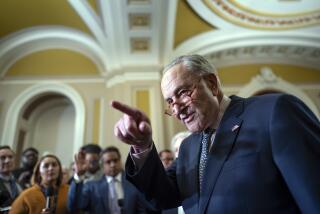Lawmakers complain over naming of ‘czars’
WASHINGTON — President Obama’s appointment of “czars,” or policy coordinators, is drawing new fire from lawmakers in both parties.
They complain that Obama’s naming of the czars circumvents the Senate’s role in confirming important nominations to the president’s administration.
In a letter to the president this week, Sen. Susan Collins of Maine and five other Republican lawmakers accused the administration of encroaching on Congress’ authority in establishing what they said were too many far-reaching czars.
Collins identified 18 positions created by Obama that “may be undermining the constitutional oversight responsibilities of Congress.”
The letter asks Obama to provide information about each position, including the administration’s vetting process and whether the officials will be available to appear before Congress.
The czars include Nancy-Ann DeParle, who coordinates healthcare issues within the White House; Carol Browner, who coordinates energy and environmental issues; Adolfo Carrion Jr., who works on urban affairs; and Lynn Rosenthal, who works on domestic violence and sexual-assault issues.
On Tuesday, Democratic Sen. Russell D. Feingold of Wisconsin raised similar concerns in a letter to the president.
Sen. Robert C. Byrd (D-W.Va.), in a letter earlier this year, noted that czars in previous administrations had “rarely” testified before congressional committees “and often shield the information and decision-making process behind the assertion of executive privilege.”
White House spokesman Tommy Vietor said Republicans have mislabeled key personnel.
“The term ‘czar’ is largely a media creation to make jobs that have existed under multiple administrations sound more exciting,” Vietor said. “Every president since Nixon has hired smart and qualified people to coordinate between agencies and the White House.”
The term goes back at least as far as 1957, when the press called James Killian the “missile czar” in the aftermath of the Russians’ launch of Sputnik.
During the 1970s oil crisis, Frank Zarb was known as the energy czar under President Ford. President George H.W. Bush appointed William J. Bennett in 1989 as the first drug czar. The second Bush administration also had numerous intelligence and domestic-security czars.
The Obama administration itself rarely refers to officials as czars, and some of them have been confirmed by the Senate or placed in positions created by Congress.
--
More to Read
Get the L.A. Times Politics newsletter
Deeply reported insights into legislation, politics and policy from Sacramento, Washington and beyond. In your inbox three times per week.
You may occasionally receive promotional content from the Los Angeles Times.










